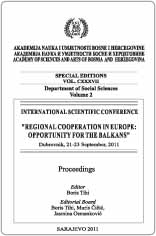Cooperation for European Integrations: Educational Institutions of Western Balkans
Cooperation for European Integrations: Educational Institutions of Western Balkans
Author(s): Jasmina Osmanković, Renato Zrnić, Vanja KenjićSubject(s): Economy
Published by: Akademija Nauka i Umjetnosti Bosne i Hercegovine
Keywords: education; regional cooperation; South-East Europe; development; competitiveness
Summary/Abstract: Introducing the democratic parliamentarian system in ’90-es of the twentieth century, Western Balkans countries started transition processes. Some of the countries passed the war destruction challenges, as well as the post-war reconstruction experiences. Post-war experiences coincide with transitional effects, which make strong impact on socio-economic status of countries. Global recession impact and requirements of the EU pre-accession process represent the great challenges for countries of the region, which will unavoidably make influence on the higher education area, as well as on its role in the society. In the republics of former Yugoslavia, public educational institutions have had a central role in educational process, which led to inherited strong public orientation on public universities in newly formed countries. In the same time, higher education sector have unusual growth and strong diversification of educational programmes and institutions. Growth of the university system sometimes really meant division of some universities into smaller units, which came as consequence of war and fragmentation of territories and educational systems. Crisis of trust in faculties and universities also exists, and public authorities who finance higher education question the readiness of the higher education institutions to respond to the needs of students and other stakeholders in higher education field. The need to improve the regional cooperation, in order to strengthen the position of the public educational institution in the region, becomes the important question. Preserving the important societal role of the public educational institution, reaching the high quality standards and contributing to integrations of countries in EU represent the imperative of future activities. Initiative for continuous cooperation in South-East Europe region, started by the International offices of the public faculties/schools of economics in the region may be a step in the concrete progress of regional cooperation. The focus of this paper is the assessment of the possibilities for closer collaboration of public faculties/schools in Western Balkans region, and defining the possible advantages of joint activities. The assumption is that the collaboration will contribute to increase of competitiveness of the region, increase of know-how and experiences transfers, but also the increase in the attractiveness for the foreign students through the organization of joint study and research programmes. Additionally, paper will include possible effects on improving the image and relations with international accreditation bodies and faculties/schools, as well as the impact on costs of international presentations and study programmes organization.
Journal: Posebna izdanja Akademije nauka i umjetnosti BiH
- Issue Year: 2011
- Issue No: 2
- Page Range: 205-216
- Page Count: 12
- Language: English

